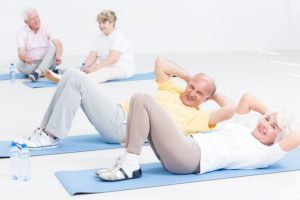 Physical activity improves psychological well-being and reduces the risk of heart attack in older adults. Lead author of the study Julia Boehm explained, “Researchers have long studied how physical activity can lead to improved mood and feelings of well-being, however, less well understood is whether being happy and optimistic might actually encourage a person to be physically active.”
Physical activity improves psychological well-being and reduces the risk of heart attack in older adults. Lead author of the study Julia Boehm explained, “Researchers have long studied how physical activity can lead to improved mood and feelings of well-being, however, less well understood is whether being happy and optimistic might actually encourage a person to be physically active.”
Physical activity is a key health behavior that is often linked to mental and physical functioning. Greater physical activity is also linked to a greater reduction of many health conditions, including cardiovascular disease.
Advertisement
People who enjoy psychological well-being are often more inclined to partake in physical activity, which translates into a better overall state of health.
Rates of physical activity tend to be lower among middle-aged adults and decline in older age. Researchers suggest that interventions to increase the number of people who are physically active may be able to reduce health burdens later on in life.
Dr. Boehm added, “What we wanted to do in this study was to assess psychological well-being before assessing physical activity to determine if happier adults are more likely to exercise than their less happy peers.”
The study asked participants about frequency and intensity of their physical activity over the course of 11 years. Based on their responses, participants were then categorized into either sedentary activity, low activity, moderate activity, or high activity group.
The researchers found that greater psychological well-being was associated with greater physical activity. Furthermore, those who were more physically active were less likely to reduce their level of activity throughout the years.
Dr. Boehm concluded, “These findings have implications for health care as medical professionals often have difficulty persuading adults to increase physical activity. Results from this study suggest that higher levels of psychological well-being may precede increased physical activity; therefore, it is possible that psychological well-being could be a novel way of not only enhancing psychological health but also increasing physical activity—which in turn could improve the physical health of a large segment of people in an aging society.”
